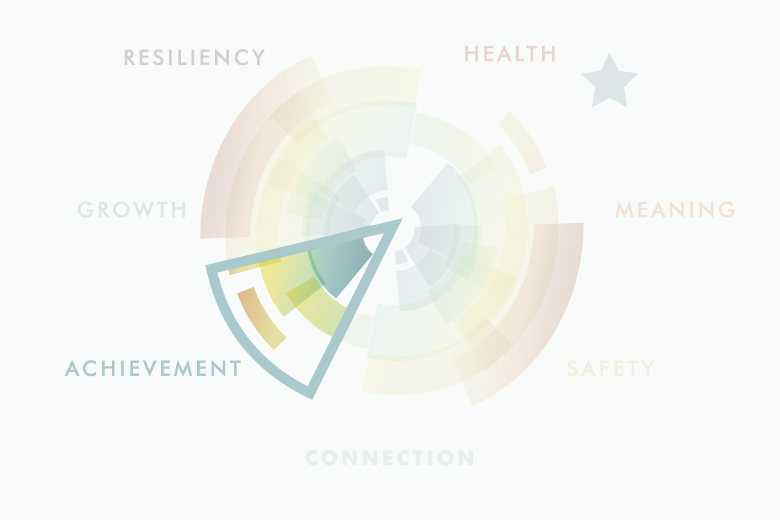During the COVID-19 pandemic, people spent a lot of time isolated and indoors, which helped foster an environment where some people now feel lonelier than ever. The result is a loss of social connectedness—the degree to which people feel the social connections and relationships in their lives to satisfy their wants and needs. When social…
Your Welcoa membership has expired.
Removing Barriers in the Workplace to Help Employees Achieve
ACHIEVEMENT: Feeling you have the support, resources and autonomy to achieve your goals. Succeeding at meeting your individual goals and work aspirations.
Why is ACHIEVEMENT critical to making the workplace whole again?
Wellness thought leader and culture expert Judd Allen has collected data about goal achievement from thousands of employees across thousands of organizations. No matter what the job type, region or industry, he will tell you that one thing is consistent across all populations of people. If you ask employees whether they have attempted a healthy lifestyle change in the last 365 days, 80% percent of them will say yes. If you ask those same employees whether they were successful at making the change, only 20% of them will say yes. This is not new information, but it should be a guiding light for wellness professionals toward the future of a well workplace. As employees return to work, rather than trying to convince them that they need to achieve a goal for their health through incentives or other motivational strategies, stop to consider that they already have this basic human need to achieve. It is not that they do not want to change, but their lives have become more messy and difficult now more than ever and there are many barriers stacked against them. Making the workplace whole again requires taking an honest look at what barriers the workplace puts between employees and the achievement of their goals, and working thoughtfully and systemically to try to remove them.
How does fostering ACHIEVEMENT affect the working human?
In WELCOA’s definition of wellness, achievement is about both work-related goals and personal goals. Employees who do not feel like they have what they need to meet their work goals will become frustrated and move on from the organization or—perhaps worse—stay in the organization but become disengaged. Thriving organizations understand that, for many employees, feeling a sense of achievement or receiving recognition of successes is more satisfying than the end-task itself. When it comes to lifestyle-related goal achievement, the workplace has just as much power. Americans spend approximately 90,000 hours of their lives at work. This means more time spent at work than with their families or even than sleeping. If the workplace can foster achievement of its employees goals for well-being, they will reduce that delta between setting lifestyle goals and achieving them. Think about the health impact that could be made if eighty percent of your workplace were not just setting goals to be more well, but actually achieving their goals for being more well!
What are the first steps to improving ACHIEVEMENT in the workplace?
To do this, we have to stop setting goals for employees. While it may be the role of the organization to set goals for employee performance and provide feedback and recognition along the way, well-being goals are a completely different animal. In a recent WELCOA Pulse, Global Well-Being Director for LinkedIn, Michael Susi, shared that LinkedIn asks its employees to be their own scientist when it comes to their health. How does a tweak I make to my diet or exercise routine make me feel? Better or worse? What can I learn from that about choices that improve my health? When we set targets for employees, we are not building competencies for their own personal health. We aren’t helping them achieve the goals they have for themselves. External recommendations and external rewards fly in the face of listening to our bodies and deeply understanding what makes us well. The role of the organization is to remove barriers for being well through providing opportunities and space to be active, access to healthy food, benefits structures that make it affordable to achieve compliance with preventive care, and policies and procedures that prevent overwork and burnout.
How is WELCOA implementing strategies for ACHIEVEMENT in our organization?
When it comes to work-related goals, we at WELCOA champion calculated risk-taking and set challenging goals as a team. During on-boarding, employees are asked how they like to receive feedback so managers can be mindful about the most meaningful ways to provide feedback on progress and achievements. It is also part of our culture to incorporate giving kudos during daily all-team meetings. When we are in the office, we physically bang a gong to celebrate both individual-level and team-level accomplishments. When it comes to health goals, we do not set targets or offer biometrics or health risk screenings. We just offer flexibility so that employees can engage in the behaviors they need to to protect their health and humanness. One thing that has worked well for us (especially when we are working from home) is assigning week-long accountability partners who document each other’s goal for the week and check-in and provide motivation along the way.
What are WELCOA resources that support ACHIEVEMENT?
Looking for employee education resources that build competencies for achieving the the goals we set for ourselves rather than setting goals and targets on their behalf? WELCOA’s Well Balanced employee newsletter was designed in line with our philosophy on whole-person health. It is also customizable with your own logo and messaging. Subscribe in either print or digital format! Learn more here.
To read all posts in the Definition of Wellness series, visit the below links:
- Making the Workplace Whole: Meeting Basic Human Needs
- How Better Connection Can Make the Workplace Whole
- What is the Meaning of All of This? Strategies for More Purpose at Work
- Why Growth Opportunities Give Employees a Reason to Show Up
- Forget Stress Management: The Future of Work Requires Resilience
- Cultivate Physical and Psychological Safety in Your Workplace
- Why Traditional Health Still Matters, But We Have to Get It Right!

Sara Martin, MS // Interim Chief Executive Officer • WELCOA
Sara has launched award-winning wellness programs and engineered work environments to create cultures of health across multiple industries. At WELCOA, her role is to ensure you continue to have access to the best products and information so you can achieve your professional and personal wellness goals.




